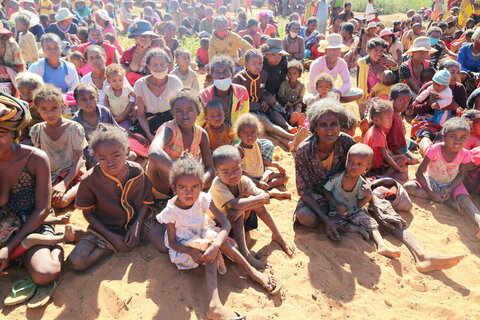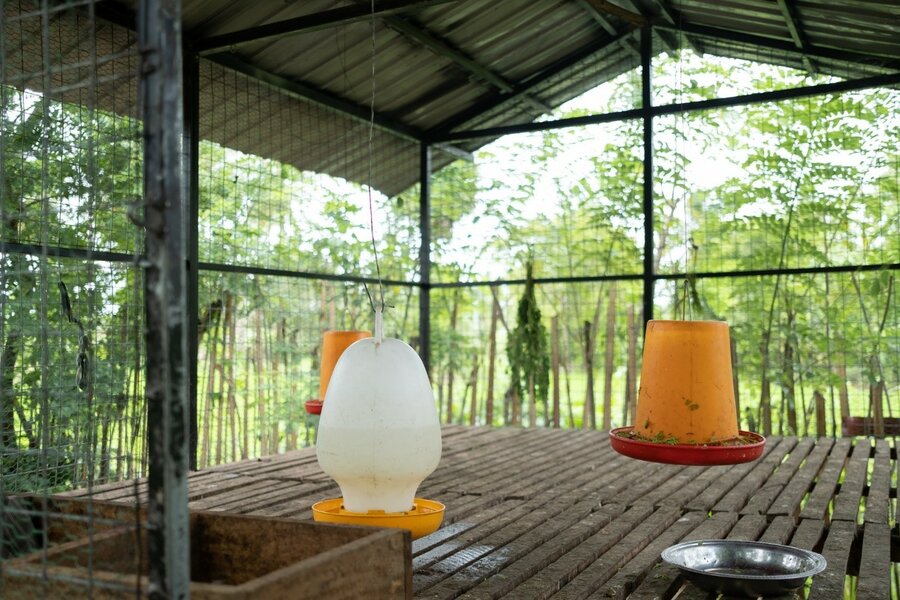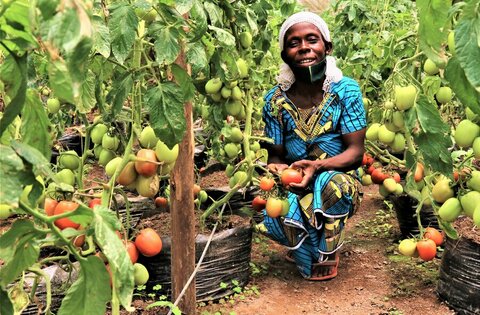Home-grown heroines: The farmers boosting school meals in Sri Lanka
Damayanthi stands outside her house in Wilgamuwa, Matale, in Sri Lanka, surrounded by her husband, four children... and more than 100 chickens.
A school meal caterer for over six years, Damayanthi has been growing produce and cooking meals for 40 children enrolled in the national school meal programme in the Srimath Montigopallawa primary school.
Her half-acre garden is filled with fruits, vegetables and chicken coops.
Stories you may have missed from wfp.org

“Gardening is my passion,” says Damayanthi. “It gives me so much joy to cook meals using produce from my own garden and feed children who are not my own.”
Damayanthi is one of thousands of women who have taken up work as caterers to provide food for over 1 million school children enrolled in the national school meal programme. The advantages of linking smallholder farmers like her with the school meals programme include providing children with the nourishment they need to learn while giving smallholder farmers a steady, reliable source of income.

But as with many other food systems models, there are shortfalls that must be addressed for it to endure – for what started as a profitable business to supplement her husband’s income became increasingly difficult for Damayanthi to sustain.
“The school meal programme has pre-determined nutritional requirements for the children’s meals,” says Damayanthi. “The children have to be given eggs twice a week to ensure they receive adequate protein. But the price I paid for one egg accounted for two-thirds of what I am given as payment for each meal. I was barely making any profit and two years ago I was ready to give up.”
'Many of the children come to school on an empty stomach and eagerly wait for me to serve them their meals. I can see how their energy levels pick up after they’ve eaten'
Damayanthi learnt of the Home Grown School Feeding Programme, a project initiated by the United Nations World Food Programme (WFP), which supports local agricultural production to enhance the quality and sustainability of the national school meals rollout. By providing tools, training and other assistance, WFP’s Home Grown School Feeding project empowers smallholder farmers and caterers like Damayanthi to independently produce nutritious meals and sustain school catering as a profitable business model.
She was among the first participants of WFP’s Home Grown School Feeding pilot project which commenced in 2020. “With assistance from the Government and WFP, I was able to set up a poultry farm of 40 chickens,” says Damayanthi. “Along with the chicks, I also received poultry feed, chicken coops and training on rearing poultry. In just six months, I have more than tripled the number of hens from 40 to 130! I collect an average 50 eggs a day.”
Water scarcity is a recurring problem faced by communities in Matale. “Every year, I faced the same problem of not having adequate water to maintain my crops,” says Damayanthi, describing the cyclical pattern of hardship she encountered. “I received a water tank which means that I can now store water and use it for my crops during times of restricted water supply.” She was also provided with gardening equipment and nutrient-dense plants and seeds to improve her home garden, along with training to cultivate.
Two of Damayanthi’s children need regular treatment for epilepsy. “My husband works as a clerk at the Education Department. His income was only sufficient to pay for my sons’ treatment and settle some loans we had taken,” says Damayanthi, describing their financial difficulties. “With support from WFP … I am able to sustain my school meal catering business to feed children healthy meals. We now have adequate money to meet all our basic needs.”
'The pandemic hit us hard. All of us, except for my husband, contracted the virus ... schools have been shut which means that I am no longer able to provide meals to the school'
By working with the Government, WFP’s project helps strengthen the sustainability of the school feeding programme eco-system so that smallholder farmers are better able to independently produce healthy, diverse and fresh food for schoolchildren. It also ensures that the caterers and smallholder farmers – largely made up of mothers from poor, rural communities – gain access to a steady source of income.
“Many of the children come to school on an empty stomach and eagerly wait for me to serve them their meals. I can see how their energy levels pick up after they’ve eaten,” says Damayanthi.
“The pandemic hit us hard,” she adds. “All of us, except for my husband, contracted the virus ... schools have been shut which means that I am no longer able to provide meals to the school.”
WFP helped set up a small marketplace nearby where Damayanthi can sell her fruits and vegetables. It also linked Damayanthi with the families of the schoolchildren to whom she normally supplies food.
Training empowers women farmers in Sri Lanka

By selling the eggs to them at subsidized rates, Damayanthi is able to earn an income while the families of the schoolchildren receive eggs at affordable prices.
Damayanthi describes how much her life has improved since joining WFP’s Home Grown School Feeding Programme: “My garden and chickens give us so much more than what we put in. They not only give us food but also financial security and hope for a better future.”
WFP is working towards expanding its Home Grown School Feeding Programme to assist up to 7,000 farming families and feed 170,000 schoolchildren across several districts in Sri Lanka. The programme will enhance national food systems and boost local economies to help lift communities out of the cycle of poverty and malnutrition.



